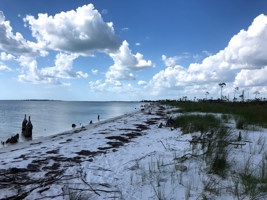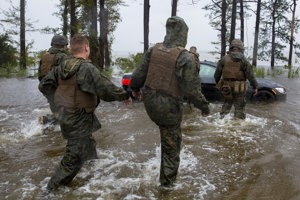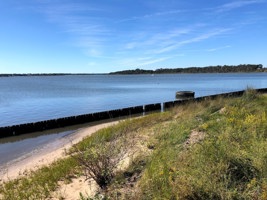- Home >
- Strategic Plan and Focus Areas >
- Coastal Resilience and Regional Adaptation
Coastal Resilience and Regional Adaptation



AFWA 2023 Climate Adaptation Leadership Award Video
On September 25, 2023, SERPPAS received the 2023 Climate Adaptation Leadership Award for Natural Resources from the Association of Fish and Wildlife Agencies! SERPPAS was recognized in the “Broad Partnership” category for demonstrating exemplary leadership in reducing climate-related threats and promoting adaptation of the nation’s natural resources. To learn more about the AFWA Climate Adaptation Leadership Awards for Natural Resources, visit: https://www.fishwildlife.org/afwa-inspires/climate-adaptation-network/climate-adaptation-leadership-awards
About
Extreme weather events and increasing changes in environmental conditions due to climate change, including hazards such as hurricanes, flooding, sea level rise, extreme temperatures, drought, and wildfires, put military readiness, natural resources, communities, and working lands at risk. These serious threats to mission assurance and mission-essential functions require collaboration to successfully enhance resilience across geographical and governance boundaries.
Although the missions of the SERPPAS partners are different, the partners share an interest in ensuring resilience and advancing adaptation in the face of these challenges. The SERPPAS Coastal Resilience and Regional Adaptation Work Group fosters collaboration among Federal, State, and local partners to build capacity, develop plans, share resources, and implement projects that increase resilience for military installations and communities. Collaboration on coastal resilience and regional adaptation, with a focus on integrating nature-based solutions into resilience planning and projects, will provide significant benefits to all partners and their respective missions.
This collaboration will increase shared knowledge, resources and tools among natural resource agencies, the military, and local communities by expanding the opportunities for successful solutions. As a result, SERPPAS will better protect our people, our military installations, our lands and waters and wildlife, our towns and cities, our forests and farms, our economic opportunity, and our quality of life. From the perspective of military mission sustainment, regional collaboration and coordination on climate resilience will: minimize loss of coastal training infrastructure or interruption of operations at low-lying bases; minimize the potential for new species placement on the endangered species list and/or critical habitat designated in the vicinity of military installations; prioritize watershed protection for increased water supply resilience and flood mitigation on installations and surrounding communities; minimize damage to stormwater systems and other utilities shared between bases and communities; and increase the effectiveness of joint installation and community planning for and recovering from severe weather events and changing environmental conditions.
Strategic Objectives
- Continue expanding partnerships and capacity focused on connecting DoD installations and surrounding communities on climate resilience planning and actions.
- Explore how climate change is influencing the other SERPPAS focus areas and identify opportunities to collaborate.
- Use and assist in the development of mapping tools, such as the SERPPAS good map, that can advance climate resilience planning and implementation.
- Support the South Atlantic Salt Marsh Initiative (SASMI) and the Marsh Forward Plan.
- Support the development, implementation, and evaluation of nature-based solutions for climate resilience projects benefiting military missions and communities in the southeast.
Work Group Lead

Michelle Covi is the Coastal Resilience DoD Liaison at University of Georgia Marine Extension and Georgia Sea Grant working regionally in the Southeast to connect Sea Grant programs with military community coastal resilience projects through a partnership with SERPPAS and the Readiness and Environmental Protection Integration (REPI) program.
Michelle comes to Georgia after six years as a coastal resilience lead in the Virginia Sea Grant extension program with Old Dominion University and six years with a coastal hazards center at East Carolina University where she also completed her Ph.D. in Coastal Resources Management. Michelle is a UGA alumna, having received her master’s degree in zoology (marine science) after completing research at the UGA Marine Institute. She lives on her husband’s family farm in Hartwell, Georgia, just a couple of miles from the Savannah River
Request to Join Work Group
Resources
Documents
 Best Practices and Guidance for Engaging with Military Installations for Climate Resilience in Defense Communities
Best Practices and Guidance for Engaging with Military Installations for Climate Resilience in Defense Communities Promoting Coastal Resilience through Partnerships and Planning: Communities, Sea Grant Programs, SERPPAS, and Military Installations
Promoting Coastal Resilience through Partnerships and Planning: Communities, Sea Grant Programs, SERPPAS, and Military Installations Advancing Coastal Resilience in the Southeast Defense Communities - 2022 Sea Grant/SERPPAS Workshop Report
Advancing Coastal Resilience in the Southeast Defense Communities - 2022 Sea Grant/SERPPAS Workshop ReportWork Group Presentations
OLDCC Installation Resilience Review Projects Series (part 1)
OLDCC Installation Resilience Review Projects Series (part 2)
Military-Community Climate Resilience Planning - Hampton Roads, VA
OLDCC Installation Resilience Review Projects Series (part 3) - NWS Earle
OLDCC Installation Resilience Review Project Series (part 4) - South Florida
Websites
Coastal Resilience DoD Liaison Program
Federal and State Funding for Coastal Resilience in Defense Communities
REPI Resilience Primer
USACE South Atlantic Coastal Study
Southeast Climate Adaptation Science Center
Defense Coastal/Estuarine Research Program (DCERP)
Gulf of Mexico Alliance
How to Consider Climate Change in Coastal Conservation
Department of the Interior Nature Based Solutions Roadmap
South Atlantic Salt Marsh Initiative
NCICS-Precipitation Frequency
News

For the love of salt marshes: Michelle Covi fights for coastal resiliency
6/11/24
SERPPAS Coastal Resilience and Regional Adaptation work group lead Dr. Michelle Covi was featured in an article from UGA Research about her work as the Department of Defense’s coastal resiliency liaison through UGA Marine Extension and Georgia Sea Grant.
Visit the SERPPAS News Archive
Announcing 2024 Sentinel Landscapes to Address Climate Change Impacts and Strengthen Military Readiness
5/15/24
The Sentinel Landscapes Partnership, comprised of the U.S. Department of Agriculture (USDA), Department of Defense (DOD), and Department of the Interior (DOI), announced the designation of five new sentinel landscapes. In these landscapes, natural and working lands thrive alongside military installations and ranges. The partnership is excited to welcome these new landscapes and support their partners' work to mitigate climate change impacts and improve sustainable land and water management practices around military installations.
Visit the SERPPAS News Archive
DOD and Department of the Interior Renew Partnership for Conserving Wildlife and Supporting Military Readiness
5/15/24
Leaders from the Department of Defense and the Department of the Interior met at the Pentagon in May to celebrate the renewal of the Recovery and Sustainment Partnership (RASP) following the signing of a Memorandum of Understanding earlier this year designed to advance the recovery of threatened and endangered species while also supporting national security.
Visit the SERPPAS News Archive
REPI Program Releases the REPI Challenge FY 2025 Request for Proposals
5/6/24
DOD's REPI Program is pleased to announce the release of the REPI Challenge Fiscal Year (FY) 2025 Request for Proposals (RFP). The REPI Program designed the REPI Challenge to help meet its ambitious conservation goals while aiming to cultivate new projects, harness creativity, and protect critical testing and training capabilities.
Visit the SERPPAS News Archive
2025 National Coastal Wetlands Conservation Grant Program RFP Released
4/24/24
USFWS is seeking applications from eligible state agencies for the 2025 National Coastal Wetlands Conservation Grant Program. Applicants may apply for matching grants between $50,000 and $1,000,000 to fund coastal wetlands acquisition, restoration, and management projects that conserve and enhance coastal wetlands as defined in the Coastal Wetlands Planning, Protection and Restoration Act. A total of $20 million is available across approximately 25 awards.
Visit the SERPPAS News Archive
2024 REPI Report to Congress Released
4/11/24
The 18th annual REPI Report to Congress summarizes the program’s investments at 124 locations across 37 states and territories, highlights partnerships across local, state, and Federal agencies, and showcases mutually beneficial projects in the Pacific Region. Through the support of partner organizations, the REPI Program aims to enhance the Nation's defense capabilities, positively impact surrounding communities and the environment, and maximize taxpayer benefits. The REPI Program’s cost-effective projects and expanded partnership opportunities would not be possible without support from partners who share a common goal of safeguarding military missions, preserving the natural environment, and reducing risks from extreme weather events.
Visit the SERPPAS News Archive





Events & Webinars
- The New National Water Prediction Service (NWPS)
-
August 29, 2024
Webinar (hosted by NOAA) - RAE 2024 Coastal & Estuarine Summit
-
October 6 - 10, 2024
- 78th Annual SEAFWA Conference
-
October 12 - 16, 2024
Augusta, GA - Navigating Military Readiness Through Responsible Project Execution
-
December 11, 2024
Webinar (hosted by REPI)
SERPPAS Meetings
September 2024
- Fall 2024 Steering Committee Meeting
-
September 10 - 11, 2024
Atlanta, GA







